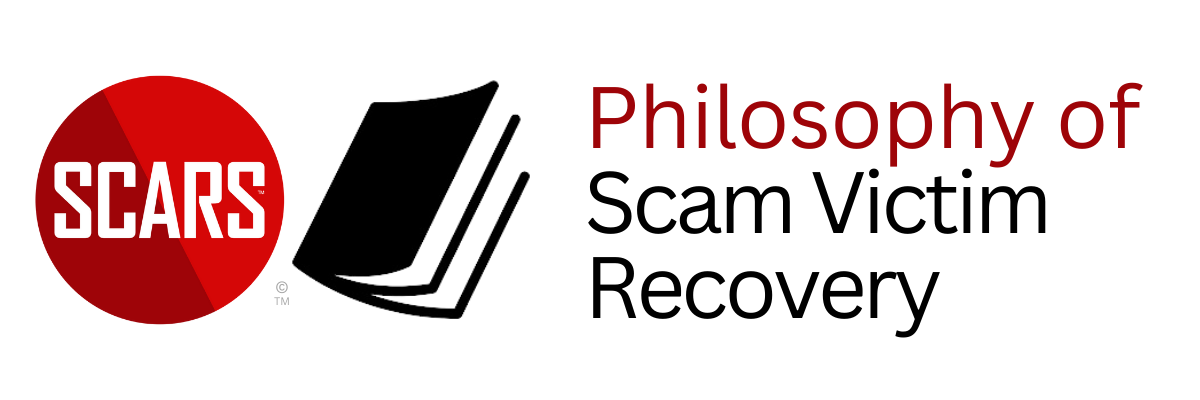Joseph Campbell’s ‘The Cave’ – What You Fear Holds Your Treasure
The Cave You Fear to Enter: Scam Victim Recovery and the Treasure Within
Primary Category: Scam Victim Recovery Philosophy
Author:
• Tim McGuinness, Ph.D., DFin, MCPO, MAnth – Anthropologist, Scientist, Polymath, Director of the Society of Citizens Against Relationship Scams Inc.
About This Article
Recovery after a scam feels much like standing at the entrance of a dark, unfamiliar cave, filled with fear and uncertainty. Joseph Campbell’s insight, “The cave you fear to enter holds the treasure you seek,” captures the experience perfectly. The cave symbolizes the unprocessed emotions—grief, anger, shame, and fear—that must be confronted to move forward. By stepping inside, you gain not only understanding but also the tools to rebuild trust, resilience, and confidence.
Recovery requires facing your fears, acknowledging your pain, and learning from what happened without self-blame. It is a conscious decision to seek education, set new boundaries, and trust yourself again. Though fear will accompany you, it does not have to control you. Each step toward healing brings you closer to the treasure within: a stronger, wiser, and more self-aware version of yourself.
Note: This article is intended for informational purposes and does not replace professional medical advice. If you are experiencing distress, please consult a qualified mental health professional.

The Cave You Fear to Enter: Scam Victim Recovery and the Treasure Within
Joseph Campbell once wrote, “The cave you fear to enter holds the treasure you seek.”
Joseph Campbell’s simple but powerful idea applies directly to the experience of scam victims standing at the beginning of their recovery journey. After the devastation of betrayal, you face an uncertain path forward. Recovery often feels like a dark cave—unknown, frightening, and filled with doubt. Yet, as Joseph Campbell suggests, it is precisely by entering this place of fear that you will find healing and the restoration of your confidence, trust, and self-worth.
Understanding the Cave Envisioned by Joseph Campbell
The metaphorical cave is the place where all unresolved emotions and shattered beliefs reside after the scam. It holds grief, anger, shame, distrust, and fear. Walking into it requires confronting not only what happened but also what it did to your sense of self. It is easier to stay outside the cave, lingering at the threshold, hoping that time alone will erase the damage. Yet standing still only prolongs the pain.
The cave is not a punishment. It is the necessary passage where you come to terms with what was lost and, more importantly, what can be reclaimed. It is where recovery begins.
Why Fear Holds You Back
Fear after a scam is natural. You have been deceived. Your instincts have been exploited. Trust, once freely given, now feels dangerous. Moving forward feels risky. What if you make another mistake? What if you are hurt again?
These fears are not irrational. They are the mind’s attempt to protect you from further harm. Yet in doing so, they can also trap you. Remaining afraid, refusing to confront what happened, means carrying the scam with you indefinitely. The wound does not heal because it is never properly addressed.
Avoidance feels safe in the short term. In the long term, it builds walls that isolate you from life, relationships, and self-respect.
What Lies Inside the Cave
Inside the cave is not just fear. There is also your treasure or reward.
In Joseph Campbell’s metaphor, the treasure is the deeper understanding of yourself—a renewed ability to trust carefully, to protect yourself wisely, and to rebuild a life that is more resilient and grounded. It is not the naive trust you once had but a mature, tested confidence.
Recovery teaches you how to live fully without abandoning caution, how to form connections without losing yourself, and how to stand strong without closing off your heart. These are not small gifts. They are hard-won treasures only available to those who dare to enter the cave.
The Journey Through the Cave
Recovery is not a single decision. It is a series of choices made day after day.
First, you choose to acknowledge what happened without minimizing it. The betrayal was real. The pain was real. Your reaction to it is valid.
Second, you choose to face the emotions instead of suppressing them. Grief, anger, shame, and fear must be allowed to surface if they are ever to be understood and released.
Third, you choose to seek knowledge and support. Education about scams, about emotional recovery, and about psychological resilience becomes your torchlight inside the cave.
Finally, you choose to believe that healing is possible. Even when it feels distant, even when progress is slow, you commit to moving forward.
Each step into the darkness brings you closer to the treasure you seek.
Standing at the Threshold
After a scam, you stand at the entrance of the cave. Behind you is the wreckage left by betrayal. Ahead is the unknown.
It is tempting to turn away, to pretend that nothing more needs to be done. It is tempting to settle for survival instead of striving for recovery. Yet survival alone leaves the scam in control of your future. Recovery returns that control to you.
Choosing to step into the cave is an act of courage. It is not reckless. It is not naive. It is the deliberate decision to reclaim your life.
Recognizing the Fear
Acknowledging your fear is important. Denying it will not make it disappear.
You may fear:
- Being vulnerable again
- Trusting the wrong person
- Facing the emotions that the scam triggered
- Discovering uncomfortable truths about yourself
These fears are understandable. They do not make you weak. They make you human. What matters is not whether you feel fear but whether you allow it to dictate your actions.
Fear is a companion on the journey, not a barrier.
Acquiring Knowledge and Learning from the Experience
Inside the cave, you learn not just about scams but about yourself. You learn how and why the scam succeeded. You recognize the points where trust became blind, where emotion clouded judgment, and where warnings were missed.
This learning is not about blaming yourself. It is about equipping yourself. To begin that learning, go to www.SCARSeducation.org to enroll in the free Scam Survivor’s School.
You become more aware of:
- Your emotional triggers
- The tactics used by scammers
- Healthy boundaries and warning signs
Knowledge becomes part of your defense. It empowers you to move forward without carrying the same vulnerabilities.
Transforming Pain into Strength
The treasure at the heart of the cave is not the absence of pain. It is the transformation of pain into strength.
You do not erase the past. You integrate it. The experience becomes part of your story, but it does not define it. You carry forward not the weight of betrayal but the lessons learned from it.
Pain teaches compassion. It teaches resilience. It teaches you to recognize value—in yourself and in others.
The cave is where you stop seeing yourself as a victim and start seeing yourself as a survivor.
Moving Beyond the Cave
Emerging from the cave does not mean forgetting what happened. It means carrying it differently.
You come out not as you were but as someone wiser, stronger, and more self-aware. You have faced what you feared. You have seen the worst and chosen not to be defeated by it.
This does not guarantee a life free of challenges. It guarantees a life where challenges do not control you.
Choosing to Heal
Healing is not passive. It is an active, conscious choice.
It involves:
- Seeking education through resources like the SCARS Institute
- Engaging in therapy or support groups
- Building new, healthy relationships
- Setting clear boundaries
- Allowing yourself time to grieve
There is no set timetable. Healing takes as long as it takes. What matters is the direction.
By choosing to heal, you choose life over fear. You choose growth over stagnation.
You choose to find the treasure.
Trusting Yourself Again
One of the greatest losses after a scam is trust—not just in others but in yourself.
You may doubt your judgment. You may question your worth. You may wonder if you can ever trust anyone again.
Rebuilding self-trust is part of the treasure.
You can trust yourself again. You can learn to listen to your instincts without ignoring red flags. You can learn to balance openness with discernment.
Trusting yourself means believing that you are capable of making good decisions, even after betrayal.
Stepping into the Light
Joseph Campbell’s words remain true: “The cave you fear to enter holds the treasure you seek.”
Fear is natural. Fear signals that the journey matters.
When you step into the cave of your recovery, you step toward reclaiming your life. You step toward a future that is not defined by betrayal but by courage.
You do not have to do it all at once. Each small step is a victory.
You have already survived the scam. Now you have the opportunity to do more than survive. You have the opportunity to heal, to grow, and to thrive.
The cave is there, and so is the treasure.
The only question is whether you will enter.
Reerence
-/ 30 /-
What do you think about this?
Please share your thoughts in a comment below!
Important Information for New Scam Victims
- Please visit www.ScamVictimsSupport.org – a SCARS Website for New Scam Victims & Sextortion Victims.
- SCARS Institute now offers its free, safe, and private Scam Survivor’s Support Community at www.SCARScommunity.org – this is not on a social media platform, it is our own safe & secure platform created by the SCARS Institute especially for scam victims & survivors.
- SCARS Institute now offers a free recovery learning program at www.SCARSeducation.org.
- Please visit www.ScamPsychology.org – to more fully understand the psychological concepts involved in scams and scam victim recovery.
If you are looking for local trauma counselors, please visit counseling.AgainstScams.org
If you need to speak with someone now, you can dial 988 or find phone numbers for crisis hotlines all around the world here: www.opencounseling.com/suicide-hotlines
Statement About Victim Blaming
Some of our articles discuss various aspects of victims. This is both about better understanding victims (the science of victimology) and their behaviors and psychology. This helps us to educate victims/survivors about why these crimes happened and not to blame themselves, better develop recovery programs, and help victims avoid scams in the future. At times, this may sound like blaming the victim, but it does not blame scam victims; we are simply explaining the hows and whys of the experience victims have.
These articles, about the Psychology of Scams or Victim Psychology – meaning that all humans have psychological or cognitive characteristics in common that can either be exploited or work against us – help us all to understand the unique challenges victims face before, during, and after scams, fraud, or cybercrimes. These sometimes talk about some of the vulnerabilities the scammers exploit. Victims rarely have control of them or are even aware of them, until something like a scam happens, and then they can learn how their mind works and how to overcome these mechanisms.
Articles like these help victims and others understand these processes and how to help prevent them from being exploited again or to help them recover more easily by understanding their post-scam behaviors. Learn more about the Psychology of Scams at www.ScamPsychology.org
SCARS INSTITUTE RESOURCES:
If You Have Been Victimized By A Scam Or Cybercrime
♦ If you are a victim of scams, go to www.ScamVictimsSupport.org for real knowledge and help
♦ SCARS Institute now offers its free, safe, and private Scam Survivor’s Support Community at www.SCARScommunity.org/register – this is not on a social media platform, it is our own safe & secure platform created by the SCARS Institute especially for scam victims & survivors.
♦ Enroll in SCARS Scam Survivor’s School now at www.SCARSeducation.org
♦ To report criminals, visit https://reporting.AgainstScams.org – we will NEVER give your data to money recovery companies like some do!
♦ Follow us and find our podcasts, webinars, and helpful videos on YouTube: https://www.youtube.com/@RomancescamsNowcom
♦ Learn about the Psychology of Scams at www.ScamPsychology.org
♦ Dig deeper into the reality of scams, fraud, and cybercrime at www.ScamsNOW.com and www.RomanceScamsNOW.com
♦ Scam Survivor’s Stories: www.ScamSurvivorStories.org
♦ For Scam Victim Advocates visit www.ScamVictimsAdvocates.org
♦ See more scammer photos on www.ScammerPhotos.com
You can also find the SCARS Institute’s knowledge and information on Facebook, Instagram, X, LinkedIn, and TruthSocial
Psychology Disclaimer:
All articles about psychology and the human brain on this website are for information & education only
The information provided in this and other SCARS articles are intended for educational and self-help purposes only and should not be construed as a substitute for professional therapy or counseling.
Note about Mindfulness: Mindfulness practices have the potential to create psychological distress for some individuals. Please consult a mental health professional or experienced meditation instructor for guidance should you encounter difficulties.
While any self-help techniques outlined herein may be beneficial for scam victims seeking to recover from their experience and move towards recovery, it is important to consult with a qualified mental health professional before initiating any course of action. Each individual’s experience and needs are unique, and what works for one person may not be suitable for another.
Additionally, any approach may not be appropriate for individuals with certain pre-existing mental health conditions or trauma histories. It is advisable to seek guidance from a licensed therapist or counselor who can provide personalized support, guidance, and treatment tailored to your specific needs.
If you are experiencing significant distress or emotional difficulties related to a scam or other traumatic event, please consult your doctor or mental health provider for appropriate care and support.
Also read our SCARS Institute Statement about Professional Care for Scam Victims – click here
If you are in crisis, feeling desperate, or in despair, please call 988 or your local crisis hotline – international numbers here.
More ScamsNOW.com Articles
A Question of Trust
At the SCARS Institute, we invite you to do your own research on the topics we speak about and publish. Our team investigates the subject being discussed, especially when it comes to understanding the scam victims-survivors’ experience. You can do Google searches, but in many cases, you will have to wade through scientific papers and studies. However, remember that biases and perspectives matter and influence the outcome. Regardless, we encourage you to explore these topics as thoroughly as you can for your own awareness.















![NavyLogo@4x-81[1] Joseph Campbell's 'The Cave' - What You Fear Holds Your Treasure - 2025](https://scamsnow.com/wp-content/uploads/2025/04/NavyLogo@4x-811.png)









![scars-institute[1] Joseph Campbell's 'The Cave' - What You Fear Holds Your Treasure - 2025](https://scamsnow.com/wp-content/uploads/2025/04/scars-institute1.png)

![niprc1.png1_-150×1501-1[1] Joseph Campbell's 'The Cave' - What You Fear Holds Your Treasure - 2025](https://scamsnow.com/wp-content/uploads/2025/04/niprc1.png1_-150x1501-11.webp)